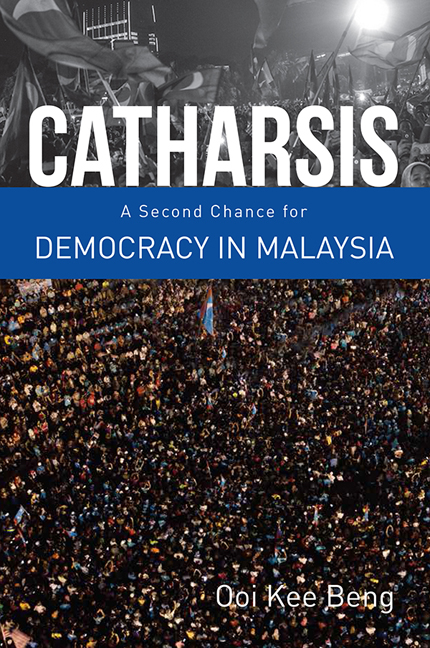Book contents
- Frontmatter
- Contents
- Foreword
- 1 Introduction – Malaysia's Future Is Redeemed
- Before Pakatan Harapan
- Before 9 May 2018
- With Mahathir at the Helm
- 31 One Thing Is Certain—There Will Be More Amendments to the Constitution
- 32 The More Things Change, the More Things May Actually Change
- 33 Did Merdeka Liberate or Create Malaya?
- 34 Interview with Nurul Izzah Anwar: Rebuilding a Nation Long Divided
- 35 The Diminishing of Humans Through Identity Politics
- 36 The Art of Dismantling Cultural Pluralism
- 37 No Need to Let Bigots Dictate Policy
- 38 What the Penang Floods Say About Malaysian Politics (and It's Not Just About Climate Change)
- 39 This is the Moment of Truth for Malaysia's Race-based Politics
- 40 We are Equal Only Through Our Vote
- 41 Why the Opposition Has a Shot at Toppling the Barisan Nasional with Mahathir at the Helm
- 42 Spiralling Back towards Reformasi
- 43 Individual Freedom Is a Matter of National Survival
- 44 Why Meet the Twenty-first Century with Twentieth Century Mindsets?
- 45 A Final Quarrel between a Repentant Grandfather and Oldfashioned Self-absorbed Parents
- 46 Outraged Enough to Go Vote or Cynical Enough to Stay Home?
- Beyond 9 May 2018
- About the Author
44 - Why Meet the Twenty-first Century with Twentieth Century Mindsets?
from With Mahathir at the Helm
Published online by Cambridge University Press: 12 February 2019
- Frontmatter
- Contents
- Foreword
- 1 Introduction – Malaysia's Future Is Redeemed
- Before Pakatan Harapan
- Before 9 May 2018
- With Mahathir at the Helm
- 31 One Thing Is Certain—There Will Be More Amendments to the Constitution
- 32 The More Things Change, the More Things May Actually Change
- 33 Did Merdeka Liberate or Create Malaya?
- 34 Interview with Nurul Izzah Anwar: Rebuilding a Nation Long Divided
- 35 The Diminishing of Humans Through Identity Politics
- 36 The Art of Dismantling Cultural Pluralism
- 37 No Need to Let Bigots Dictate Policy
- 38 What the Penang Floods Say About Malaysian Politics (and It's Not Just About Climate Change)
- 39 This is the Moment of Truth for Malaysia's Race-based Politics
- 40 We are Equal Only Through Our Vote
- 41 Why the Opposition Has a Shot at Toppling the Barisan Nasional with Mahathir at the Helm
- 42 Spiralling Back towards Reformasi
- 43 Individual Freedom Is a Matter of National Survival
- 44 Why Meet the Twenty-first Century with Twentieth Century Mindsets?
- 45 A Final Quarrel between a Repentant Grandfather and Oldfashioned Self-absorbed Parents
- 46 Outraged Enough to Go Vote or Cynical Enough to Stay Home?
- Beyond 9 May 2018
- About the Author
Summary
We should not forget that in the days before social media and news websites, the flow of information – basically through schools and through daily newspapers, television and radio stations, was highly centralised and easily controlled.
Then came the 1990s and the Internet took over our lives in a big way, and with it a blogging culture began to flourish. For Malaysia, it coincided with the disastrous 1997–98 Asian Financial Crisis.
This democratisation of communication – and knowledge – accelerated with the coming of social media. SMSes, Facebook, Twitter, WhatsApp and Instagram, among other developing technologies provided everyone with the means to express themselves from below and to access news sites not controlled by the government.
The search engine revolution has given us immediate access to most facts, sweeping aside the rows of encyclopaedias and dictionaries in our homes.
Hypertext allows us to connect ideas in ways we could not before.
The development of the smartphone only a decade ago has taken the liberating of the individual from his or her immediate surroundings to a whole new level. The preferred apps and the preferred settings on his or her smartphone now decide and define the flow of information and the lines of communication.
We can now choose our own news, our own threads of thought and our own special collection of ‘friends’ and contacts. And we can now rant and gripe and believe anything that our individual sociocultural situation, our personal history and our own level of knowledge prone us to do.
This opening of the mind is something strongly positive, no doubt. It empowers people. But as with all mass empowerment, it has led to a fragmentation of collective values and a decentralisation of public discourses – and also to governments losing whatever ability and coercive power over knowledge that it had had to imbue the majority of its citizens with a sense of common causes.
Keeping the World Twittered
How governments and how governing in general adapt to this, is a subject for immediate research. American President Donald Trump's twisted tweet communication with the world can be understood merely as an old man's way of awed handling – and retreating from – a world technologically changed beyond his recognition and holding that changing world hostage in the process.
- Type
- Chapter
- Information
- CatharsisA Second Chance for Democracy in Malaysia, pp. 166 - 168Publisher: ISEAS–Yusof Ishak InstitutePrint publication year: 2018

